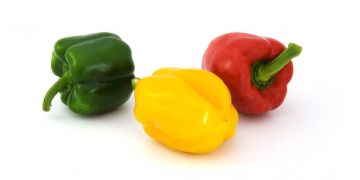Black Pepper (Piper nigrum) is a flower-producing vine in the Piperaceae family and is harvested for use as a seasoning, spice, or health supplement. When dried, the fruit is referred to as a peppercorn and contains a single seed. When fully mature it is a deep shade of red and measures about 0.20 inches. The black powdery form of pepper with which most individuals are familiar is derived from grinding mature peppercorns until they reach a fine texture. Black pepper is extensively harvested in India where it is found in abundance. Pepper grows best in warm climates and tropical regions and Vietnam is currently the world's largest exporter of pepper.
Cayenne Peppers (Capsicum annuum) are long, thin peppers that are grown in abundance in the Caribbean, South America, Africa and India. These peppers are members of the deadly nightshade plant family, although they are not at all harmful to humans. They are also used mainly for culinary purposes such as flavoring, but offer a spicier, more intense flavor than black pepper. Cayenne pepper, sometimes simply referred to as red pepper, can also be purchased in supplement form.
History of Pepper
Pepper has been used as a flavoring additive on the Asian continent since at least 2000 BC. Peppercorns were regarded as a highly valuable commodity and sometimes referred to as "black gold" when being traded between countries. Pepper was so expensive in old world Europe that it was frequently used as collateral in business ventures.
Black pepper and other Indian spices changed world history as they were partly responsible for the efforts of the Portuguese to find a new nautical route to India during the exploration era which ultimately helped along the colonization of the Americas. Pepper has been widely used in the United States ever since and this will most likely continue throughout future centuries.
Health Benefits of Pepper Supplements
Black pepper
Like most spices of the Eastern world, pepper was traditionally regarded as a medicine as well as a seasoning. Black Pepper was believed to cure a vast array of conditions such as earache, indigestion, insect bites, joint pain, heart disease, liver problems and tooth decay. Black pepper is still widely used in standard Indian medicine as a natural treatment for chest congestion, colds and sore throats. In addition, black pepper extract has been found to contain anti-carcinogenic effects and antioxidant properties.
Piperine
Pepper is currently enjoying some attention by herbalists and holistic professionals around the country as scientific research and controlled studies have suggested that piperine—a component of pepper--can significantly increase the body's absorption of beta-carotene, vitamin B and selenium.
The Piperine in black pepper also has thermogenic properties and encourages the breakdown of lipids in the blood which are known to place individuals at risk for heart disease and stroke. Further studies are underway concerning its effect on beta-endorphin and serotonin production in the brain.
Cayenne
Cayenne pepper supplements may also offer a vast array of health benefits including improved circulation and the elimination of fatty deposits that cling to one's arterial walls. Better circulation encourages the delivery of nutrients to the bones, tissues and organs.
Cayenne has been used in the Caribbean, India and Africa for centuries as a remedy for myriad digestive problems. Contrary to what most individuals believe, pepper does not create stomach problems, but rather aids digestion and prevents nausea.
For more information see our Cayenne Article
Cure for upset stomach
When one has what is commonly referred to as "upset stomach," a dose of pepper can right this occurrence in certain cases. This is due to the fact that pepper is an acid forming rather than an alkaline forming food, and when ingested, stomach enzymes immediately go to work to balance the acid and alkaline combination that was momentarily disrupted by the introduction of pepper to the stomach's lining. These enzymes coat the stomach immediately, and it is for this reason many people find almost instant relief from their nausea upon ingesting pepper. There is evidence that cayenne pepper may also increase the production of digestive acids and saliva, which break down food and speed digestion. Cayenne supplements may also bolster the immune system and help the body to fight colds and flu.
Pepper Plants
Black pepper grows on a perennial woody vine which can grow as high as six feet. Its leaves are long and its flowers small and the vines climb rough bark more easily than bark of a smoother texture. A single stem can bear over thirty fruiting spikes and as previously mentioned, the part used to create supplements or spice up food is the peppercorn. Cayenne peppers are long, bright red, and curl slightly at their end giving them a crescent shape. They enjoy the same climate as black pepper for growing purposes, but grow in the form of a fruited plant rather than on a vine. The actual fruit is the part of the plant in which the health benefits are found.
Dosage
Although many herbal supplements are frequently used in the form of tea, due to their strong taste, pepper supplements can be taken in capsule form or added to food. Black pepper is most often consumed in its culinary spice form and the amount ingested is a matter of taste for most individuals. It is also available in capsule form and is generally labeled "bioperine extract" when packaged this way. The standard dose of the capsule form is ten milligrams once a day.
Cayenne supplements come in a standard dose of 40,000 HU per capsule and a person may take one to three capsules a day. In addition, one can add the actual fruit to food recipes in order to consume the pepper in its most natural form.





